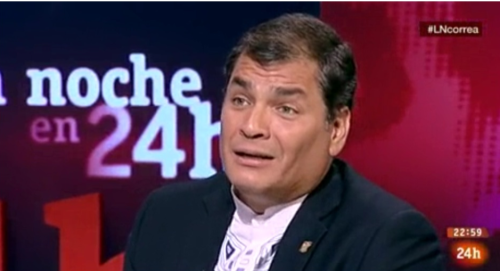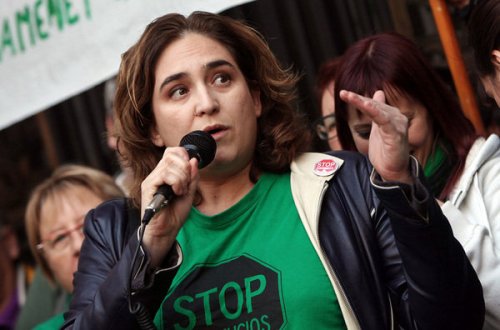This is a partial transcript of an interview conducted by the Spanish State broadcaster TVE with the President of Ecuador Rafael Correa, conducted April 19th.
Despite the dull-headed questions of the interviewer, which are sadly par for the course on Spanish TV, Correa makes many interesting observations on the current crisis. Foremost is his warning to the public that what is happening in Europe now is precisely what happened in Latin America.
Later on in the interview, not included in this transcript, there is a discussion of press freedom in Ecuador. I will post a transcript of this separately if I get the time.
For the moment, what strikes me on listening to the first part of the interview, is both the lucidity of Correa’s explanations by contrast with the robotic idiocy of ruling politicians in Europe, especially in periphery countries. It was interesting how Michael D. Higgins’s speech to the European Parliament about a new ‘emancipatory discourse’ won such widespread acclaim, in Ireland at least, even though -or perhaps precisely because- he did not make mention of capitalism, neoliberalism, socialism or anything that might prove politically controversial for either his audience or Ireland’s media establishment.
By contrast, Correa here -and it is not that his spoken discourse is radical at all- says that IMF bailout packages have nothing to do with the human being and everything to do with bailing out private banks. As Correa puts it: “The problem is power. It is a political problem, not a technical problem.”
ANA IBÁÑEZ: Let’s greet today’s guest, who is the president of Ecuador, Rafael Correa. President, good evening.
RAFAEL CORREA: Good evening Ana, thank you for the invitation, thank you to TVE, thank you to Spain, which always welcomes us with a lot of affection. Greetings to all Spanish people, and most especially, to those Latin Americans and Ecuadoreans living in this dear country.
ANA IBÁÑEZ: There are many of them.
RAFAEL CORREA: Yes.
ANA IBÁÑEZ: You are here in Spain as part of a European tour, which has taken you to different countries, among them Italy and Germany -there you met the Chancellor, Angela Merkel. How was that? How did you get on, because your economic policies are quite different.
RAFAEL CORREA: Perhaps, but there’s a mutual respect, since we respect all countries, the governments of countries, despite the ideological coincidences or differences that we might have. The tour was very successful. We met Chancellor Angela Merkel, the President of the Federal German Republic, the President of the Lower Chamber, the Mayor of Berlin, we have been in contact with German investors. An official visit to Germany. Taking advantage that official visit we wanted to go to Italy, to Spain, to thank our emigrants. Because you know that they can vote, they even have representatives in the Assembly, and the support they have given is extraordinary. Here in Spain we got as much as 83-84% of the vote. And six Assembly deputies, elected from abroad.
ANA IBÁÑEZ: In a little while we are going to speak about your re-election, Mr President, a re-election moreover via a historic majority, but I want to move on, in particular in economic matters. Here in Spain, there are many of those who blame part of the troubles we are going through on Ms. Merkel, with regard to cutbacks, deficit, structural reforms. How is the crisis we are suffering seen in Latin America, and what do you, who apart from being President also hold a PhD en Economics, believe is failing?
RAFAEL CORREA: I will say only this to you: do not repeat the same mistakes that we made. This crisis is a carbon copy of the debt crisis that took place in the 1980s in Latin America, where it wasn’t that we were loaned money by the international banking sector through solidarity, but because they had excess liquidity. Does that story sound familiar? The international organisations, the international bureaucracy, always the heralds of finance capital, invented the strategy of aggressive indebtedness. So you had to get into debt in order to keep developing. In reality they were making us serve the purposes of international capital because there was excess liquidity.
Why was there excess liquidity? Because of the two oil shocks, the rapid rise in oil prices. The Arab countries had large oil incomes, they put them into First World banks, First World banks had nowhere to put them, and they saw Latin America as a good place. And before 1976 for example, last century, a banker wouldn’t go to Latin America even as a tourist. And suddenly queues of bankers started to form to lend money for anything, even for weapons and military dictatorships. And the IMF, the World Bank, at an aggressive moment, at the right time, facilitated the development. And it developed so much that in 1982, when Mexico declared itself unable to pay, they ceased the flow of credit that had been the source of growth, they began to demand that credit back – the repayment- and the interest rates, which were floating, moved from 4-6% to more than 20%.
ANA IBÁÑEZ: In the case of Ecuador – sorry for interrupting you Mr President, what you did was, let’s say, identify that debt that you considered illegitimate?
RAFAEL CORREA: That was later on.
ANA IBÁÑEZ: And refuse to pay it?
RAFAEL CORREA: But look. Like Mark Twain says, a banker is the guy who lends you an umbrella when it’s sunny and takes it off you when it starts raining. They stopped the credit. They raised our interest rates. And the bailout package from the IMF came, exactly what is happening in Europe. But with huge adjustment programmes, austerity, memoranda of understanding, so that nothing stayed in the country, but rather so that what went in on the one side on the part of this international bureaucracy came out on the other in order to pay commercial debt with private banks. It was nothing else.
It wasn’t a matter of exiting the crisis as quickly as possible. They wanted to guarantee payment to private banks. And they pulled it off. But obviously through deepening the crisis in growth and employment. The crisis lasted ten years. In Ecuador we began the 90s with the same income per capita as in 1976. And we see that it is exactly the same thing that is happening in Europe. So the only thing I ask of you is.. let’s learn from history. Look at what happened in Latin America.
ANA IBÁÑEZ: You spoke, I imagine, with Mariano Rajoy, with different presidents of countries such as Greece, Ireland and Portugal, I understand, because I read it. Did they pay any attention?
RAFAEL CORREA: I said it at the Cádiz summit, the Ibero-American summit a few months ago. I said it: don’t commit the same mistakes that we did. We Latin Americans are experts in crisis. Not because we are enlightened, but we have all suffered them. We know it from memory that these prescriptions -and I insist on this- do not have the human being in mind. I am not criticising governments, I’m criticising systems. They do not have the human being in mind. They have in mind capital, and especially finance capital.
ANA IBÁÑEZ: Mr Correa, how are relations between Ecuador and Spain?
RAFAEL CORREA: Very good, but let me respond to the question you asked me. We renegotiated our debt in 2008. Because from that crisis on -so that you understand- in ten years Ecuador paid in net terms around $2bn -at the height of the crisis- to the international banking sector. And despite that our debt tripled. Because of the accumulation of interest, poor negotiations etcetera. It was shown that it was absolutely illegitimate and illegal. And it was because of this that we did not pay, and we bought the debt at market price, without harming the bondholders but without benefiting them either.
ANA IBÁÑEZ: Let’s continue talking about economic matters because as you well know, it’s a matter of national and international interest also, but answer my question on the matter of relations with Ecuador. What are they like now?
RAFAEL CORREA: Very good, they are very good. I have just spoken with President Rajoy to say hello. They are very good at the moment. Preoccupied of course by what is happening in Spain, and in so far as we can be of help you can always count on us.
ANA IBÁÑEZ: There is the unavoidable matter, also related to the crisis, of evictions, which here in Spain affect thousands of families, both Spanish as well as of other nationalities, among them many Ecuadoreans. I would like to know if you are in any conversation with the Spanish government on this issue, and in what way is Ecuador helping its compatriots with this problem.
RAFAEL CORREA: I insist, we are very respectful with all governments, especially a government of a country loved as much as Spain, but you said it, or you asked it. There are thousands of Ecuadoreans involved in this and we have to defend our compatriots. I do not criticise governments. I criticise systems. The law on evictions in Spain has been around for more than a century.
ANA IBÁÑEZ: They are now trying to make modifications, a submission just went ahead yesterday to the economic commission, it was approved with the votes of the Partido Popular, which is the government party.
RAFAEL CORREA: Indeed, the government of President Rajoy has moved forward to flexibilise that law a little. But it is a complete abuse by capital conducted against human beings. I would say it is even immoral. They impose things on us as if they were natural laws, inescapable laws of physics. No: it is pure and simple exploitation. All of the risk, all of the cost of the crisis is borne by human beings. Look, when banks, and bankers, had excess liquidity they even went out looking for citizens to saddle them with credit. The property bubble came along. They themselves endorsed the houses. They put the value on them. “€300,000. Here, €350,000 for a car and the furniture”. Not out of solidarity, but because they had excess liquidity and the business of banks is to saddle with credit, not to hang on to that liquidity. The crisis arrives. In good faith, the house cannot be paid. Here’s the house back. The family has to lose its house. But now the house is worth €50,000. So I end up living, as well with €300,000 (in debt), as well as losing your house you end up ruined the rest of your life. They are ruining whole lives.
ANA IBÁÑEZ: How are the Ecuadoreans responding? Are they adopting any kind of measure?
RAFAEL CORREA: A simple abuse by capital against human beings. I want to make this clear. It isn’t anything techincal. They are abusive. I would say criminal.
ANA IBÁÑEZ: We are clear on this.
RAFAEL CORREA: How are we helping? With advice. We are advising thousands of Ecuadoreans. We have conducted legal consultations at different European legal institutions, legal advice as I already mentioned and we have conducted a very deep investigation of the contracts, and what we have found is horrifying. They are contracts ..beyond the fact that the law itself is immoral, the contracts are deeply abusive. They have clauses such as, for example, “and after signing this contract we can change anything without letting you know”..basically that’s what certain clauses say. Horrifying. Barbarity.
ANA IBÁÑEZ: As you know, this programme is broadcast on the 24 hour channel, on Television Espanola, also on the international channel. There are many Ecuadoreans who are paying attention to this interview. Any of them in this situation, in danger of eviction, where should they go so that your government helps them?
RAFAEL CORREA: They can go to consulates of Ecuador in Spain, we have many of them. We also have the national secretariat for migrants, the Senami, they can go to Senami offices, they can seek advice via internet.
ANA IBÁÑEZ: Unemployment is another issue here that is making the news…
RAFAEL CORREA: That’s what we’re talking about, the crisis.
ANA IBÁÑEZ:..here in Spain. The crisis, precisely, that’s why I said we were going to keep talking a lot about economics, since there are many young people, as you know, people not so young, going to make a living in other countries, Spanish firms are looking for new business niches. In this vein, what opportunities does Ecuador offer?
RAFAEL CORREA: Opportunities I’ll talk about a little later. Let’s reflect a little on unemployment. Destroying jobs without growth does not overcome a crisis: it makes it worse. And policies are being implemented that do not depend on a government -it is the system- in this case the European system, dominated by certain countries, that are destroying jobs. They prevent growth. The European crisis is a financial crisis, it is not a crisis in the real sector. It’s one thing not to be competitive, to not have the human talent, to have one’s industry overtaken by new industries in different kinds of technology, meaning you have to re-train the labour force…those are real crises. The Spanish crisis, and the European crisis, is a financial crisis. To put it in basic terms, co-ordination. There are houses. There are people who need houses and there are banks that do not need to hang on to the house. The problem is co-ordination. And the best way of co-ordinating socially is through the currency, through monetary policy. But what you have is the insistence by the European Central Bank on having a monetary policy that is very rigid. And who do you think benefits from that monetary policy? Finance capital. The problem is power. It is a political problem, not a technical problem.













